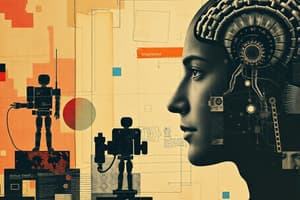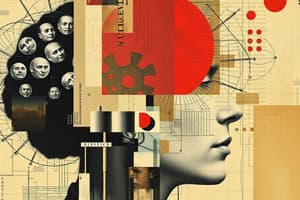Podcast
Questions and Answers
What quality distinguishes AI from traditional programming?
What quality distinguishes AI from traditional programming?
- Limited data retention
- Static instruction processing
- Adaptability through learning (correct)
- Rigidity in problem-solving
Which of the following is not typically included in the definition of intelligence?
Which of the following is not typically included in the definition of intelligence?
- Creativity
- Problem-solving
- Self-awareness
- Physical strength (correct)
What is a primary strategy that AI uses to improve performance?
What is a primary strategy that AI uses to improve performance?
- Data accumulation without analysis
- Learning from past mistakes (correct)
- Following a fixed algorithm
- Increased computational speed
Which aspect of AI relates to its ability to approach unsolvable problems?
Which aspect of AI relates to its ability to approach unsolvable problems?
What does the ability to apply learned information to new situations signify?
What does the ability to apply learned information to new situations signify?
In the context of AI, what is important for a program's learning strategy?
In the context of AI, what is important for a program's learning strategy?
What characterizes the approach of artificial intelligent programs in finding solutions?
What characterizes the approach of artificial intelligent programs in finding solutions?
Which of these is crucial for creating referable understanding models in intelligence?
Which of these is crucial for creating referable understanding models in intelligence?
In artificial intelligent programs, what is symbolic representation primarily used for?
In artificial intelligent programs, what is symbolic representation primarily used for?
How do AI systems typically approach complex problem-solving?
How do AI systems typically approach complex problem-solving?
What is a significant limitation of artificial intelligent programs in solving problems with uncertain data?
What is a significant limitation of artificial intelligent programs in solving problems with uncertain data?
Which statement best explains how knowledge is structured in artificial intelligent programs?
Which statement best explains how knowledge is structured in artificial intelligent programs?
Why can the solution of second degree equations not typically be derived from artificial intelligent programs?
Why can the solution of second degree equations not typically be derived from artificial intelligent programs?
How do artificial intelligent programs handle incomplete information?
How do artificial intelligent programs handle incomplete information?
What is a crucial characteristic that distinguishes artificial intelligence from traditional statistical programs?
What is a crucial characteristic that distinguishes artificial intelligence from traditional statistical programs?
What is an expected outcome of a lack of information integration in artificial intelligent programs?
What is an expected outcome of a lack of information integration in artificial intelligent programs?
Flashcards are hidden until you start studying
Study Notes
Artificial Intelligence (AI)
- AI simulates human mental capabilities and work patterns through software.
- A key characteristic is the ability to learn and make conclusions without explicit programming.
- AI aims to create computer systems that mimic human functions, such as language learning, administration, thinking, and problem-solving.
Philosophy of Intelligence
- Intelligence is defined by various factors like logic, abstract thought, understanding, self-awareness, communication, learning, emotional knowledge, memory, planning, creativity, and problem-solving.
- Intelligence can be broadly defined as the ability to perceive information, retain it as knowledge, and apply it to create understanding models.
AI Properties
- Learning ability: AI programs learn through observation and past mistakes, relying on machine learning strategies.
- Empirical research: AI programs handle problems with no pre-defined solutions through empirical research methods. They experiment with options instead of following a predefined path.
- Knowledge and representation: AI programs use symbolic representation to express information and build knowledge bases. These bases contain facts, relationships, and rules.
- Data uncertainty: AI programs can handle incomplete or uncertain data, aiming to find solutions even if the data is not perfect.
- Symbolic representation: AI programs represent information through symbols, mimicking human representation using non-numerical symbols.
Conclusion
- AI seeks to mimic human intelligence through learning, problem-solving, and symbolic representation.
- AI programs are designed to make decisions based on incomplete information and learn from previous experiences.
Studying That Suits You
Use AI to generate personalized quizzes and flashcards to suit your learning preferences.




